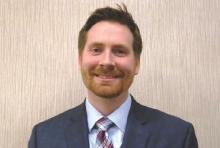Do you ask your patients, “Have you served in the military?”
That simple inquiry could have a major impact on whether military veterans get needed services and legal assistance, Patricia E. Roberts, director of the Lewis B. Puller Jr. Veterans Benefits Clinic at William & Mary Law School, Williamsburg, Va., said at a meeting sponsored by America Bar Association.
When encountering veterans in need of benefits or legal services, physicians also can help by contacting a local American Legion, VFW, or local U.S. Department of Veterans Affairs (VA) regional office, William A. Burke, a maritime lawyer based in Norfolk, Va., said at the meeting.
A growing number of law school clinics such as the Lewis B. Puller Jr. Benefits Clinic also address veterans’ legal needs, largely at no expense to the veteran. The newly created National Law School Veterans Clinic Coalition includes 30 such law school clinics that have veterans assistance programs.
Strong partnerships between physicians and lawyers are essential in linking injured veterans to needed medical treatment and financial assistance, Ms. Roberts and other legal experts said. The VA identifies legal needs as among the most significant unmet needs of homeless and poor veterans.
Physicians and lawyers need to work together or at least be in communication with one another, Kenneth J. Goldsmith, legislative counsel and director of state legislation for the ABA governmental affairs office, said at the meeting. Physicians are frequently the first stop, as many veterans have easier access to medical professionals or may have more trusting relationships with their doctors.
The lawyers acknowledged that physicians inexperienced with the process of helping patients apply for benefits through the VA can be hesitant to get involved. Common misconceptions include that the documentation process is lengthy, that the burden of evidence must be high, and that physicians may be called as witnesses.
Ms. Roberts stressed that the burden of evidence that a disability is linked to military service does not have to be absolute. In veterans’ law, a doctor has to conclude that there is a 50% likelihood that a disability is service connected or that it is “just as likely as not.”
“With that standard, which I think is lower than in other arenas ... medical professionals could have even more of an impact than they realize,” she said.
To receive disability compensation that a veteran earns through service, the veteran must prove: a current disability, that the incident that caused the injury occurred during active duty, and that there is a nexus between the current disability and the veteran’s active duty service.
In straightforward cases, a doctor needs to fill out the VA’s disability questionnaire. No further VA contact or participation is necessary, Ms. Roberts said. More time is required if a medical records review is needed or if a veteran is claiming multiple injuries linked to military service.
Not every case is simple, however. In some instances, it may be difficult for health providers to parse psychological injuries of conflict from a mental illness the veteran had before serving, Mr. Burke said. Making matters more complicated is the potential aggravation of a prior mental illness during service. “There’s really a latticework of comorbidities at play here – PTSD, depression, anxiety, sleep disorders, substance abuse problems – and ... substance abuse is seen as a symptom [by the VA] rather than a disorder in and of itself. It’s a real challenge.”
Veterans stuck in the backlog of claims often are halted because of delayed physician documentation, which can be significant in certain complex cases, according to Mr. Goldsmith.
“You’re talking about when a veteran comes in claiming 36 different kinds of injuries,” he said. “The doctor is not compensated to [fill out forms]. But doctors who are savvy, [who] do understand these issues, and what the VA’s interested in seeing, can go through it more expeditiously.”
*Correction, 1/5/2016: A previous version of this article misstated William A. Burke's title.
On Twitter @legal_med



